Okay, so you’re having a ‘quarter-life crisis’ just like everyone else. Here’s how you can cope.
When you Google ‘quarter-life crisis’ you quickly discover that it’s not a new phenomenon. Newspapers and magazines have been writing that young people are heading for their version of the mid-life freak out since the early 2000s.
Last week, LinkedIn released research which claimed that 72 per cent of young professionals in the UK have had a quarter-life crisis, with the majority of them experiencing their existential melt down at the grand old age of 26.
According to this research, being able to get on the property ladder is the biggest pressure facing young professionals. We can all agree that a study was definitely needed to uncover this piece of information and that nobody had any idea at all why we were all running around in a frenzied state of self-destruction. Nope, none at all.
A quarter-life crisis doesn’t, generally, involve spending all of your money on a sports car or throwing away a perfectly good relationship by having an affair with someone younger because it is not borne out of boredom with what you do have and regret at all the things you never got around to doing. Unlike a mid-life crisis which, let’s face it, is ultimately about the realisation that you’re going to die, the quarter life crisis is the product of improbability and concern about all the things you do not yet have.
LinkedIn reckon the average quarter-life crisis lasts 11 months. I can confirm that this sounds about right. I had one, between the ages of 26 and 27. I quit my job, spent money I didn’t have on going to India, went on a lot of bad dates, read self-help books and contemplated my fate in a room the size of an airing cupboard. I think it was probably the closest I’ve ever come to complete self-destruction and I lost a lot of stuff.
By this I mean, I quite literally misplaced things because I was so drunk that I would leave my belongings behind me in a trail wherever I went. The most devastating was the loss of a gold necklace that my mum had given me. Leaving my job, which was a loss of a more deliberate kind. I didn’t lose my boyfriend, I knew exactly where he was, but I did leave him for a while. I also lost some friends and some of my ‘favourite’ belongings because I sold them on eBay to pay rent.
And then, one day, in the January of my 27th year on Earth, I was walking down the street and the gold necklace reappeared. It fell out of the hood of my parka. I’m a walking cliché so, obviously, I read this as a sign. I realised that I hadn’t actually lost anything at all, I’d been shedding things I didn’t want. Jobs, relationships, homes and friends who just didn’t fit right anymore.
What had felt like wrecklessness turned out to be prudent. I was lighter both in terms of emotional baggage and physical possessions and, for the first time in my adult life, I felt like I could actually get on with living.
I stopped worrying about the fact I couldn’t afford to buy a house and focused on what I could do. I could find a job I really loved, I could enter into a healthy relationship and stop chasing horrible boys, I could ditch people who made me feel bad about myself and make new friends and I could stop buying fast fashion in an attempt to make me feel better about myself.
A quarter-life crisis might stem from worrying about what you don’t have but, going through it, can make you realise what you do have. A crisis is, by definition, a time when a difficult decision has to be made. It’s a turning point when an important change takes place; in medicine the term is used to describe the point at which a person suffering from an illness will either start to get better or go into unstoppable decline. After the confusion of a crisis, comes recovery and clarity.
OK, so you don’t have a house or a bank account full of savings, but you do have free will. Late capitalism wants you to feel bad. It wants you to feel anxious on Black Friday and buy things you can’t afford. It wants you to spend all of your money so you keep working. It wants you to be anxious. It wants you to have a quarter-life crisis and then read articles that make you feel bad about having one.
You can choose to stop worrying about all the things that are completely outside of your control and make the best of what you have. You can choose to stop scrolling through Instagram in cycles of compare and despair and focus on your own life. And, you can definitely choose to see a quarter-life crisis not as a downward spiral of despondency but as an opportunity to reassess and start doing things differently.










